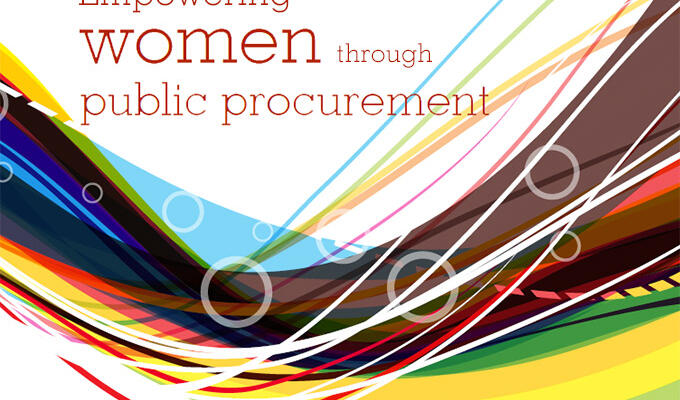
ITC urges governments to increase public procurement from women vendors
(Kigali) – The International Trade Centre (ITC) today launched an initiative to increase the number public procurement contracts being awarded to women-owned businesses (WOBs). Currently only an estimated 1% of public-procurement contracts globally are awarded to WOBs or women entrepreneurs.
Announcing the initiative at the annual Roundtable of the Global Platform on Sourcing from Women Vendors, held in Kigali, Rwanda, ITC Executive Director Arancha González said: ‘Women account for half the world’s population and have a concrete role to play in economic development. We can collectively improve the 1% of public procurement that finds its way to women-owned businesses.’
To accompany the announcement of the initiative, Ms. González unveiled a guide – ‘Empowering women through public procurement’ – that will help governments to develop guidelines for public procurement that will facilitate sourcing of more goods and services from women entrepreneurs. Whereas many governments have for a long time used public-procurement policies as a tool to promote socio-economic objectives, few have used public procurement to unleash the economic potential of women entrepreneurs.
The guide looks at the challenges commonly faced by women entrepreneurs in accessing and participating in public procurement. It also sets out techniques for overcoming these barriers and provides advice on designing targeted assistance strategies to increase public procurement from women-owned businesses. This includes establishing mandatory goals or targets; subcontracting plans; preferences; reservations; and capacity building.
Ms. González said that targets need to be put in place to ensure governments can better monitor the number of contracts being awarded to women entrepreneurs. ‘Aware that we are starting from a low base, 50% is a long way off. But if 3%, 4% or 5% of government contracts went to WOBs, this would be an achievement,’ she said. ‘We are calling for a fairer system in which women have a better chance of bidding for public tenders. After all it also makes good economic sense'.
This could be done through simple measures such as reducing the size of tenders, which would allow for women to launch a bid for a contract, as most women business owners are small or micro sized enterprises. ‘Transparency, increased access to information, standardized templates, sufficient time for preparation or pre-qualification of WOBs – these are all measures that could help ensure that more women would be eligible to submit procurement bids,’ Ms. González said.
Oda Gasinzigwa, Minister of Gender and Family Promotion, Republic of Rwanda, said: ‘In Rwanda, existing gender sensitive laws and regulations offer a unique, fiscally responsible route to empower women, including public procurement. But we, too, have some way to go, and this initiative, which sets targets for the share of public procurement that comes from women-owned business, is very much welcomed. It will help combat poverty and promote inclusive economic growth. It will help increase the participation of women-owned businesses, not only in public procurement, but also in public decision-making.’
Uganda Minister for Trade Amelia Kyambadde, participating in the launch, also committed to implement the initiative in her country. It is expected that the initiative will gather further momentum as the UN family prepares for the Beijing+20, which will review to UN’s blueprint for advancing women’s rights.
Download ‘Empowering women through public procurement’.
Download PDF version of this press.
Established in September 2010, the ITC led Global Platform for Action on Sourcing from Women Vendors is a 10-year initiative that aims to increase the amount of corporate, government and institutional procurement secured by women vendors for the ultimate purpose of bringing economic benefit to women and their communities.
The Women Vendors Exhibition and Forum 2014 (WVEF 2014) takes place on 15-17 September in Kigali Rwanda in parallel with ITC's World Export Development Forum (WEDF). This year the event features two sectors: coffee and services.
ITC is the joint agency of the World Trade Organization and the United Nations. ITC assists small and medium-sized enterprises in developing and transition economies to become more competitive in global markets, thereby contributing to sustainable economic development within the frameworks of the Aid for Trade agenda and the Millennium Development Goals.
The RDB was set up by bringing together all the government agencies responsible for the entire investor experience under one roof. This includes key agencies responsible for business registration, investment promotion, environmental clearances, privatization and specialist agencies which support the priority sectors of ICT and tourism as well as SMEs and human capacity development in the private sector.



